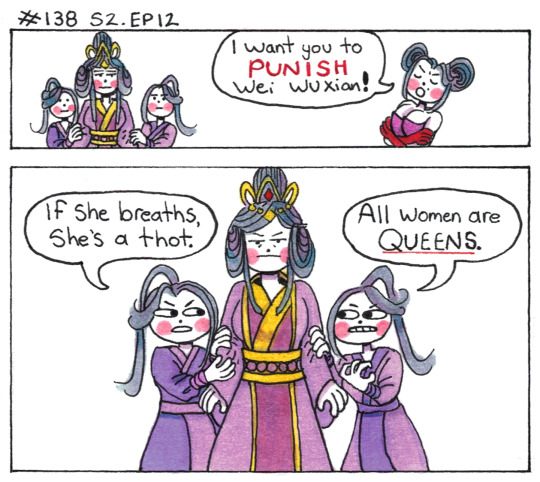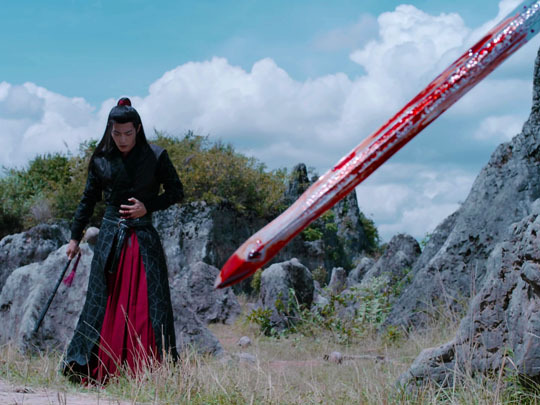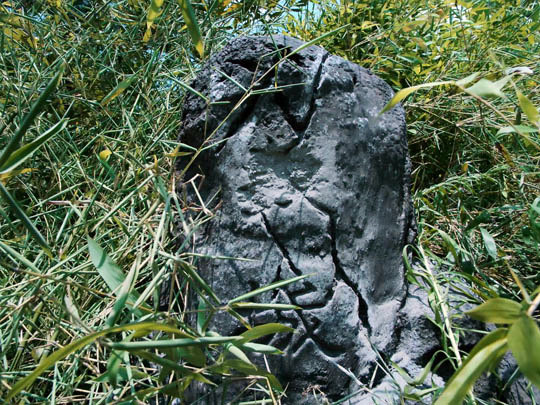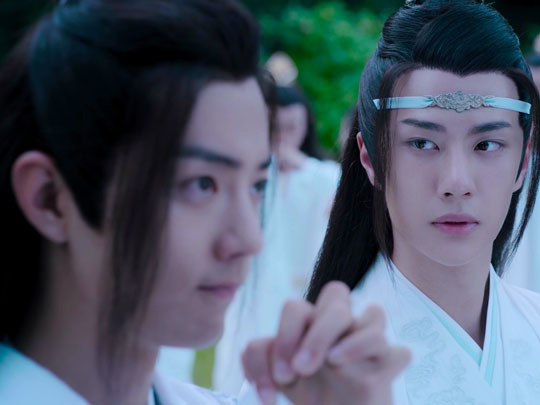#We know they came from the Yu sect along with YZY and described as 'young women' so did they likely were young when they left
Text

M'lady, doth this harlot bother thee?
[First] Prev <–-> Next
#poorly drawn mdzs#mdzs#yu ziyuan#wang lingjiao#jinzhu#yinzhu#I just want to take a moment to shine a spotlight on YZY's maids.#I fully admit to forgetting about them until I was looking up female characters in mdzs for the Six AU and saw their names.#For characters who play a small role in the story I sure do rotate the little morsels of info we know about them in my head.#We know they came from the Yu sect along with YZY and described as 'young women' so did they likely were young when they left#And we know that YZY favours them immensely (to the point she lets them speak a lot more freely than she does her own children)#And they in turn are extremely loyal to herand very skilled fighters.#So what's up with that dynamic? Who are they to her? Who are they to each other? Who are they as individuals?#My theory is that they were initially servant girls YZY took in and trained (hence the whip proficiency)#I also very much love the idea of this double standard; that YZY has these surrogate 'children' she favours over her own#to shadow JFM's affection for WWX (child who is not his own).#Jiang Cheng and Jiang Yanli just keep losing!!!#Anyways I just think we should hoist jinzhu and yinzhu up more. I think they have minor character swag and potential.
761 notes
·
View notes
Text
Wei Wuxian and Chinese Virtues of 忠孝仁义
There’s a lot of conversation about Wei Wuxian and how he struck out on his path without a concern for the Jiangs; about how he’s reckless and not giving a sh*t about his role within his society; about how he had a family and siblings and threw it all away for his sense of right and wrong. But the way I read his actions is within the context of the virtues of 忠孝仁义 (and how the virtues, especially 义, is ingrained in him via the Jiang sect motto). WWX’s major decisions can all be read as him acting in accordance with one or more of these virtues. Even when WWX is being his most irreverent self (and yes he’s rude and bring about a lot of second hand shame) he still remembers the we-self (to borrow from baoshan-sanren’s post) context as the head disciple of the Jiang Sect. Even when he seems to abandon everything, he didn’t abandon his understanding of these virtues.

First of all, let’s talk about 忠. 忠 (zhōng) is loyalty, devotion, fidelity. I usually associate the concept with loyalty towards your country but it can be applied to other units too. In the case of CQL where we don’t see an Emperor or country, it would only make sense that this concept be applied to either a person (e.g. SuShe at JGY) or a sect.
Tangent, feel free to skip: An (maybe THE) embodiment of this virtue is 岳飞 (Yue Fei), one of THE MOST famous Chinese generals. Yue Fei lived during the second half of the Song dynasty. He loved his country so much, he wrote poetry about drinking his enemy’s blood and eating their flesh (壮志饥餐胡虏肉,笑谈渴饮匈奴血) and taking back his country’s lands and saving the two previous emperors from being POWs. He is famous for the tattoo of the words “尽忠报国” (exhausting all loyalties to replay country aka i will be loyal and fight for my country until i die) on his back bestowed by his mother before he left home. When he was unjustly executed for treason, the executioners saw that on his back and the people knew a great man was wronged.
(if anyone wants a translation of the poem and a rambly share about some of my favorite Yue Fei related facts/stories, let me know. Otherwise, i’m gonna get back to our favorite necromancer)
So back to WWX. His loyalties are very much with the Jiang sect. After JFM and YZY dies, within the structure of 忠, Jiang Cheng is effectively who he needs to be loyal to because Jiang Cheng is the sect leader and essentially the symbol of the sect. The act of giving up his core to JC, then, embodies the idea of loyalty within the context of 忠. (I’ve seen memes about how WWX gave consent, WQ gave consent, but JC didn’t. drwcn has a great post about consent. For this post, i’m not going to go into it because this is outside my defined scope.) Furthermore, ��� compels WWX to protect the Jiangs. I’ve read meta that thinks WWX was trying to get himself killed based on the crossing of his hanfu and his mouthing off at Wen Chao. I’m inclined to believe that reading because if dying means JC would never find out, so be it. And as long as WWX is dead, there will be no evidence of the core transfer so JC would never lose face before other cultivators. It would mean the Jiang sect can be rebuilt to its old status without being tainted by WWX’s sacrifice.
Ok, next is 孝. 孝 (xiào) is most often translated as filial piety. I don’t think there is a good sense of it in western culture. In chinese culture, it is the expected deference younger generations need to display to elders in their direct lineage. [Note: i use lineage because you can be 孝 towards your biological parents and grandparents, your kungfu master and their master, your adopted/honor bound parents, etc but not to everyone who is in a higher generation. It’s very family/lineage based.] 孝 is complicated because it’s ingrained into Chinese kids at a really young age. Go pour your grandparents tea. Go give your grandparents a back rub. Listen to your parents. When your parents get old, you’ll take care of them. Respect your elders. Even if your elders are wrong, don’t talk back. It’s a set of emotions that tie you to your ancestry. To turn your back on it feels like turning your back on your culture and identity.
Tangent, feel free to skip: Ok, this is really cool and I had to share. In looking up 孝 in the online xinhua dictionary, it says about the etymology: “形声。从老省,从子。” This is so cool! We have two characters: 老 (old, as in Yiling Laozu) and 子 (child). You’ll notice 孝 is a character where to top part of 老 is taken and 子 essentially follows. This character is a style of character where the meaning comes from the structure of the character. So 孝 is where the children follow the old, often blindly and with disregard of their own needs.
WWX, as an orphan, can only direct his 孝 towards Jiang Fengmian and Yu Ziyuan. 1) No matter how awful they were as parents, JFM and YZY raised WWX. 2) WWX is the head disciple. That means JFM is his shifu. [He calls JC his shidi and JYL his shijie for that reason.] That teacher-disciple relation is often described as “一日为师,终生为父” (a teacher for one day should be treated like a father for life). Both 1 and 2 bind WWX to the Jiangs regardless of his adoption status. So, when on the boat YZY and JFM tell WWX to take care of JC and JYL, it’s the order of an elder in his direct lineage. To not listen, to not defer to that order would not be 孝. Considering they perished at Lotus Pier, WWX was obligated to execute those orders to their fullest whatever the price (i.e. golden core).

Along those same lines, out of 孝 (and human decency, tbh) WWX and JC had to retrieve JFM and YZY’s bodies. Wen Ning helping them out in that situation is a HUGE favor. Not to mention all the other things WN and Wen Qing does for them. I will get to the favors and their ramifications later.
Ok, moving on to 仁. 仁 (rén) is most often translated as benevolence or humanity. (I want to say I find the translation of humanity very interesting from a bilingual child’s perspective because the chinese character for person/human is 人 which is also rén. I got the concept confused a LOT.) 仁 is found in the love and kindness shown towards fellow humans. Ctext often translates it as virtue, which is a bit too broad, IMO. I think this line from Confucian Analects explain the concept succinctly:
樊遲問仁。子曰:”愛人”
Fan Chi asked about benevolence [仁]. Confucius said, "It is to love all men."
WWX embodies this love better than everyone else in the story (except maybe LSZ but LSZ probably gets it from WWX). WWX meets stuttering WN and acknowledges him, offers to give advice, and truly sees the younger man. He treats WN with kindness and friendship (and yes, he takes advantage of WN’s willingness to push him around in a turnip wagon but that’s more shenanigans). WWX also sees the Wens at Phoenix Mountain as human and steps out of line to help them. His blindfolded five arrow show stems out of his 仁. His saving Mianmian is also an expression of his 仁. So many of WWX’s actions stem from 仁. A lot of the fandom see it as his empathy and I agree! It is that! But it can also be viewed as his internalization of the virtue to love humanity.
Finally, 义. 义 (義,yì) is actually the reason this ENTIRE post came to be. 义 is the same 义 as Yi City. I offer the traditional version of the character above so you can see how it compares to the stone on the way to Yi City. You will recall when WWX says Yi City, LWJ asks, “Yi, which means chivalrous?” And WWX explains same character but for coffin/mortuary in this case.

Actually, 义 is used in a lot of words:
正义- correct/rigit + 义 = righteousness
意义 - ideal + 义 = meaning
侠义 - knight -errant + 义 = chivalry
义气 - 义 + air = personal loyalty; code of brotherhood
名义- name + 义 = nominal
义父 - 义 + father = sworn father (this is a difficult to translate idea that sometimes i translate as godfather for simplification and cultural parallelism. it’s a parent figure that you acknowledge via vows. If the character for father is replaced with brother, then it’s the relationship that the 3zun have. And OMG i want to talk about the 3zun and romance of 3 kingdoms and how much of a awful un-义 person JGY is… but also holy out of scope batman)
In the case of virtues/morality, we’re looking at 义气 - the 义 that means loyalty to people and a code of brotherhood. The Jiang Sect ancestor is described as a 游侠 (yóu xiá, wandering hero). The ancestor’s identity as a 侠 (xiá), which indicates a highly skilled martial artist/fighter who will defends others (à la wuXIA and xianXIA), places him within the world of 江湖 (jiāng hú, sometimes translated as rivers and lakes or “pugilistic world” in some wuxia subtitles). In 江湖, 义 is the most important virtue. Based on 义, you help those in need. You stand out and do what is right. You are an outlaw that follows a strict moral code. 义 is the foundation of the Jiang Sect’s motto. Furthermore, the idea of 义气 can in some ways be viewed as currency. You do me a favor, I owe you one. You treat me with decency, I return the favor. You DO NOT return kindness with ill intent. It is taboo.
WWX exemplifies 义. 义 is part of what makes him so lovable and reckless. For 义 , he sticks out his neck for LWJ during Wen Summer Camp. For 义, he follows LWJ to search for the Yin Iron. Under 义 , he is free to be the hero who lends a hand whenever it’s needed. Oftentimes, 仁 and 义 go hand in hand because to stand up and stand out for other requires love of others and seeing their humanity.
So let’s get back to the Wen remnants: for 义, WWX must protect WN and WQ. As I mentioned before, WN and WQ had done WWX and JC (and thus the Jiang Sect as a whole) MULTIPLE HUGE FAVORS. 1) saving JC from Wen Chao at Lotus Pier. 2) retrieving JFM and YZY’s bodies. 3) transferring the golden core against WQ’s best judgement. All of these actions are so vital to the survival or the reputation of the Jiang Sect. WWX knows it. I’m positive JC knows it. To turn their backs on WN and WQ would be 不仁不义 (neither 仁 nor 义). Really, the ONLY thing they should be doing from the perspective of 义 is helping the Wens to repay their kindness. But WWX knows, as the head disciple, that JC cannot afford to align the Jiang Sect in sympathy with the Wens because it’s political suicide. The Jiang Sect WILL NOT SURVIVE if Nie, Jin, and Lan all turn against them. Even if Lan stood neutral, Nie and Jin would still be able to wipe out barely rebuilt Jiang.
So what does WWX do? He has already painted himself as a rebel, as rude, as ill bred. And from an outsider looking in, WWX is in alignment with his slippery descend into darkness. WWX knows if he steps just a little more out of line, he can accomplish everything else his morality dictates. (We could talk about WHY WWX feels like it’s ok for him to give up everything and analyze WWX’s self worth and what not. But that’s also outside the scope of this post and i’m pretty sure other people have done a better job of it than I could.)
Save the Wens, run away to the Burial Mounds, and defecting are all aligned with WWX’s morals. Defecting protects JC and the Jiangs sect in an act of loyalty (忠). Defecting also protects JC and JYL, thus fulfilling the filial piety toward YZY and JFM’s instructions (孝). Saving the Wens returns the debt of 义 that JC and WWX owe to WN and WQ. Saving the Wens also appeal to WWX’s sense of 仁 towards the non-cultivators. Lastly, protecting the Wens means JC does not end up 不仁不义. From WWX’s perspective his actions are the only option for him to really have no regrets when he asks his heart.

#LONG post#meta#jiang cheng#wen qing#wen ning#my meta#character analysis#江氏家训#江澄#江晚吟#魏婴#魏无羡#wei wuxian#yunmeng jiang sect motto#tw: blood#the untamed 陈情令#陈情令#cql#mdzs#魔道祖师#i swore i tries to keep the scope narrow#i just want people to see what i see he's doing because it hurts so much#and i feel so bad for him#i am trying not to place judgement here#忠孝仁义#温情#温宁#jiang fengmian#yu ziyuan
790 notes
·
View notes